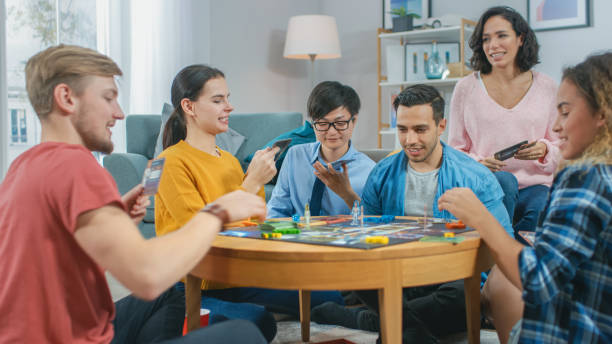
In today’s world, social media has become an integral part of teenage life. From Instagram and TikTok to Snapchat and YouTube, teens are more connected online than ever before. While social media provides a space for self-expression and connection, it can also be a source of stress, anxiety, and pressure. Understanding how to navigate social media healthily is essential for maintaining teen mental health and well-being.
3 Negative Effects of Social on Teen Mental Health

- Comparison and Low Self-Esteem: Social media often showcases highlight reels, where influencers and peers post the best aspects of their lives. This constant exposure to filtered and curated images can lead teens to compare themselves to unrealistic standards, resulting in feelings of inadequacy, low self-esteem, and body image issues.
- Fear of Missing Out (FOMO): Social media makes it easy to see what friends do in real-time. Seeing others socializing or participating in activities without them can trigger feelings of exclusion, loneliness, and anxiety, known as FOMO. This can lead teens to feel pressured to constantly stay connected online.
- Cyberbullying and Online Harassment: Unfortunately, the anonymity of social media allows for cyberbullying, which can be emotionally devastating for teens. Negative comments, rumors, or threats can contribute to depression, anxiety, and a sense of isolation. As providers of teen therapy in Woodland Hills, we hear a lot about the pervasiveness of internet bullying.
3 Ways to Navigate Social Media for Better Mental Health
- Set Boundaries with Screen Time:

It is all too easy for social media to take over hours and hours of scrolling time. The more you use it, the more you build the habit of being online. The more online you are, the harder it feels to imagine your life without social media. It becomes a self-perpetuating cycle, where the only intervention is to stop yourself by any means necessary. Your teen isn’t going to have the best impulse control when it comes to putting their away; it is up to you to ensure that your teen sees the benefits of interacting with the real world.
Establishing limits on how much time is spent on social media is a crucial step. You may realize when you are considering how to approach this topic, and what ideas you have regarding their use of social media, that you yourself are in need of some limits when it comes to being on your device. For those of us who bring our work home with us, who arrange outings for our children, who are responsible for looking in on and looking after aging parents, and other adult, real-world responsibilities, it can feel like our time on our devices is more important than our teen’s. While what we’re doing might be essential in some ways, it is important to realize that in the scheme of your teen’s life, their desire to be online can feel just as important to them. If you wish to lead by example, consider how you yourself can model boundaries with screen time for your teen. You might realize that dinner gets interrupted, or that you’re half-watching during movie night, or any other number of habits that you could try to adjust in solidarity with your teen. Prioritizing in-person time as a family is one way of bringing you and your teen closer together.
There are always more opportunities for conversation and connection when everyone is paying closer attention.
Teens can benefit from setting specific times of day to be offline, practicing digital detoxes, or using apps that track and limit screen time. These breaks can help reduce the overwhelmed and negative emotions of constant online engagement. Remember that anything you limit or restrict for your teen can cause them to experience frustration. When you are discussing your reasoning for wanting them to limit their screen time with them, approach it from a place of wanting to help them. They may still feel like they are being punished in some way; it is up to us as parents to communicate clearly why we are making the choices we are making.
Sometimes, we feel like this weakens our position. Many of us were raised by parents whose explanation was, “Because I said so.” You may hear from the people who raised you that your teen doesn’t need you to explain your decision-making and feel like you’re not being a strong enough leader. Actually, it is a parent’s job to teach, and your teen won’t learn anything from “Because I said so” except that their parent doesn’t consider them. Explaining your reasoning isn’t something you do so that your teen has a foothold to move your boundaries. It is something you do so that your teen understands that you are coming from a good place, that you want what is best for them, and that you take responsibility for guiding them toward habits that will help them be happy and healthy as they move forward in their lives.
When you want to set certain times for social media detox, ask your teen how they’d like to spend that time offline. Is there a hobby they’d like to try? Do they have a school goal they want to work toward, like improving in their chosen sport or improving their musical skills? Letting your teen know that you want them to cultivate a well-rounded life, asking them what that means to them, and then supporting them in their choice is the best way to enforce your boundaries around screen time. Replacing the behavior with something is important. Your teen buying into its importance is the deal-maker.
- Curate a Positive Online Environment:

There is no world in which a teen who enjoys being online is going to completely eschew social media. It is up to us as parents to accept that this virtual existence is a part of our children’s lives, that is part of their generational culture. Making the most of their screen time can impact their relationship with social media, and with themselves. Consider how they can use their social media to foster connections with people who they look up to, learn about things that inspire them, expand their horizons and perspectives, and mentally decompress. As a teen counselor in Woodland Hills, I hear positive feedback from teens who cleanse their following list; many are surprised at the impact it makes to see people they can relate to, people who make them feel good about themselves. Those who see us for in-person and online teen therapy report back that they are able to see more clearly whose feeds are specifically curated to look perfect once they have stopped following those kinds of accounts for a while. Sometimes, we all need to step back, take a break, and get a good look at the big picture.
Encourage teens to follow accounts that inspire positivity and promote healthy lifestyles. They should unfollow accounts that make them anxious, insecure, or upset. Surrounding themselves with supportive, uplifting content can transform their experience of social media. It will also do double duty, as you will feel better about them being online.
Whether you know it or not, you actually have a role to play in helping your teen have a positive relationship with the online world, and that role is to be supportive and understanding. If you approach the issue with a negative attitude, your teen will know that you don’t understand why it is important to them, or why. If you are able, instead, to communicate what you think is great about social media, and encourage your teen to utilize it in a way that makes them happy, then you have an in-road for dialogue about excessive and/or inappropriate use. As we all know, the best way to make sure your teen does something is to forbid it. If you try to cut off access when your teen is at home, your teen will find a friend whose parents don’t restrict access and go there. If you take away devices, your teen will save up enough money for something that can connect to the internet, hide it from you, and spend time anywhere that has an internet connection that you don’t control. This will contribute to a negative relationship with you, and with their online time as well. Unfortunately, their resentment about having to access social media in this way isn’t going to stop them; this is how they connect with their peers. It’s going to be an unhappy secret. Nobody wants that for their children. On the other hand, when you show clear respect for their relationship with social media and allow it at home to some degree, you give them permission to share their experiences with you.
Have you ever asked your teen what their favorite thing is about their platform of choice? Have you taken an interest in their favorite creator? (Yes, they likely have one.) Do you take care not to dismiss or denigrate those creators? Making fun of or diminishing something your teen loves is akin to making fun of or diminishing your teen, and they will take it that way. Instead, find something you like about the thing they love, even if the only thing you like is that it makes them happy. That’s enough. Ask them questions about the latest trend, and watch the videos they send or show you. That way, when you do have a concern, it won’t be taken as you simply being against all social media. If your teen can genuinely ask you, “Why should I listen to you? You don’t get any of this anyway,” you’re cooked (as the kids would say).
- Encourage your Teen to Engage in Real-Life Connections:

It is far easier to step away from the online world when there is something else to do! While social media can create virtual connections, nothing replaces face-to-face interactions entirely. These different connections have their place in this modern world, and having a balance is important. Teens should be encouraged to prioritize real-world relationships by spending time with friends and family, joining clubs, or engaging in hobbies. These offline experiences can provide growth through new experiences and strengthen their emotional well-being.
We would be remiss to ignore the impact that lockdowns and online schooling have had on our children since 2020. Many people who attend our Woodland Hills teen therapy sessions have confessed that in-person socialization feels extra vulnerable and that the stakes feel higher. Online, they can log off and immediately disappear from a conversation or situation that makes them uncomfortable. Navigating those feelings when you’re face to face with someone is harder. You can help your teen deal with these feelings by talking about how to exit a situation delicately, and also how to determine when politeness isn’t necessary, such as in the context of safety and/or harassment. If you give your teen the tools to navigate these relationships and dynamics, they are more likely to heed your advice about making new connections.
Sending your teen out into the outside world to meet up with friends on Halloween, go shopping at the mall, or be driven somewhere by other novice drivers, might actually trigger some of your own fears. You may recognize that, while you want your teen to thrive outside of social media, you also experience anxiety around what they will encounter when they’re no longer under your roof. Set aside time with yourself, with your co-parent, and even with a mental health professional for exploration and guidance.
Telling your teen to put down their phone and get out and socialize, but also requiring them to answer multiple texts while they’re away from you, isn’t going to reinforce what you’ve said to them.
Regardless of safety concerns, encouraging your teen to engage in real-life connections has to be about more than pushing them out the door. Listen with an open mind when they tell you what they like. Think of how you can get creative when it comes to facilitating their participation in the things they enjoy doing, with the people they want to see. This also means being prepared to reassure them and boost their morale when these real-world scenarios don’t go perfectly. We encourage our children not by manufacturing perfect scenarios for them, but by showing them that they are always resilient enough to try again when things go wrong.

We will never understand what it is like to grow up in the world our teens are navigating. Technology is moving faster and faster, trends spread like wildfire, and slang (their language) is indiscernible. What we can understand is what it’s like to be learning new things, and to want to fit in while also wanting our individuality to be respected. We can understand how the barrage of information is overwhelming, and that all of us need support in choosing what is best for us, even when it’s hard to do so. Collaborate with your teen so that they know you support them. Weigh in, but also make sure to listen. Above all, make it clear that you want them to be happy and to be safe, and that that is your goal.
Teen Therapy in Woodland Hills, CA
At Embracing You Therapy in Woodland Hills, CA, our Teen Therapy services go beyond traditional talk therapy to include skill-building. Our clinicians collaborate with both you and your teen to not only address challenges but also recognize and build upon your teen’s strengths, helping them improve their quality of life and thrive during their adolescent years.
Contact us today for your complimentary 20-minute phone consultation with our Admin Team today!



